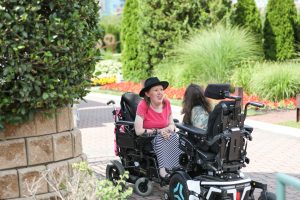

Kelly and Avery
Congenital Muscular Dystrophy (CMD) affected individuals, Kelly and Avery are making their voices heard. Together they hope to tackle misconceptions surrounding disability and give a loud voice to the, often forgotten, rare community.
Congenital Muscular Dystrophy
CMD is a rare genetic muscle disorder causing them to break down faster than they can repair or grow, which leaves Kelly and Avery as wheelchair users relying on them as their main source of mobility and independence.
Recently, the duo got together in New York City (NYC), something that’s few and far between considering there’s a good 10-hour distance between them. Kelly resides in Ohio, while Avery is just outside the NYC area.
Wheelchair users
While together, it was pertinent that they shot some powerful photographs as they navigated the city in their power wheelchairs, illustrating that mobility doesn’t halt their existence in the outside world.
‘People are still so shocked to see people in wheelchairs existing in public, even in one of the biggest cities in the world’ says Kelly.
When they’re rolling around the city side-by-side, the 2 make quite the statement. ‘People immediately redirect their eyes and don’t know how to act normally when there’s not only 1 but 2 wheelchair users present’ says Avery. ‘It’s fulfilling, shattering stereotypes and showing the public that we’re relevant in today’s world, navigating a world that was not built for us.’
Lack of accessibility isn’t a deterrent for either Kelly or Avery to be active participants in today’s society. Curbs, stairs, and/or other barriers aren’t stopping them from pursuing an active and social lifestyle. ‘We are here, we are exhausted from being excluded and it’s our time to shine, no matter what obstacles we have to overcome’ Kelly says.

Supporting others
When the friends aren’t turning heads with their power wheelchairs around the city, they support other young adults affected by rare neuromuscular conditions. Both Kelly and Avery work remotely as a part of the community outreach team for the non-profit organisation, Cure CMD. They host a bi-monthly virtual webinar together providing educational content and offering a unique angle as they are both affected by the same CMD subtype, Collagen VI.
‘We are committed to providing engaging and relevant topics that truly resonate with the rare disease community’ says Kelly. According to her, supporting the community by highlighting areas that are often ignored but are at the forefront of the minds of those living with these conditions is a main priority of theirs.
‘Avery and I feel it is our mission to bring these discussions to life and really celebrate and uplift all those living with rare neuromuscular conditions’ says Kelly, ‘offering them strength and advice in their journeys is something we’re both very passionate about.’
‘We hope that creating these conversations around disability helps others feel less alone and know their voice, too, matters, makes such a positive impact, and has power’ says Avery.

Continuing the work
Today, more than 9 in 10 of rare conditions have no FDA-approved treatment or cure, including CMD. It’s the conversations surrounding rare and advancing steps toward potential future progress that keep Kelly and Avery hopeful.
‘Just talking about it and bringing light to these conditions is helping spark that drive…any forward progression in the neuromuscular field is a win for us all’ says Avery.
The 2 will continue their advocacy efforts, in the hope that one day they will no longer need to.
